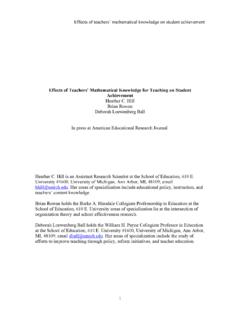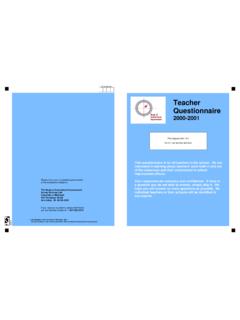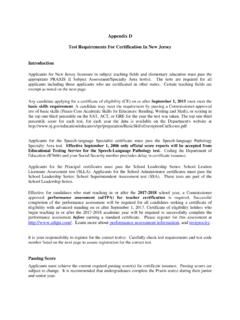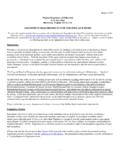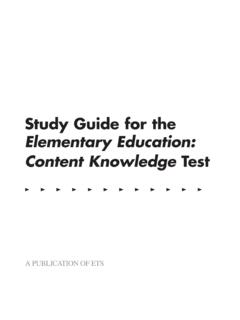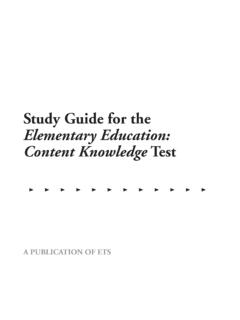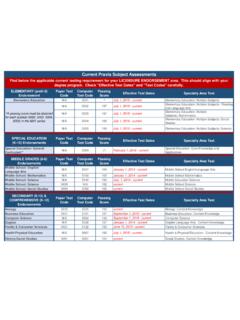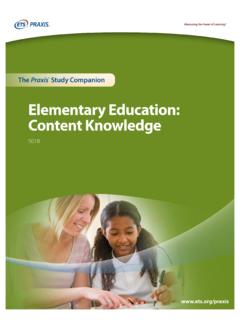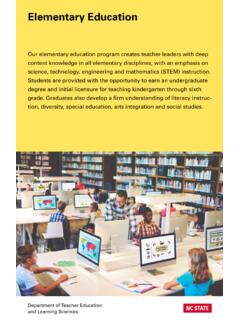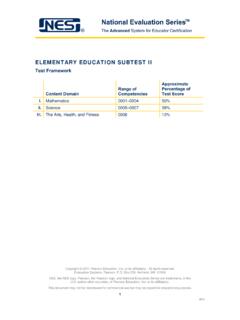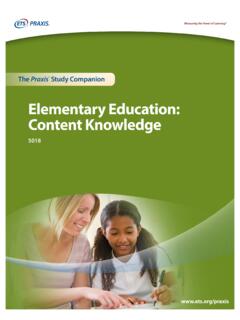Transcription of Developing Measures of Content Knowledge for Teaching …
1 Phelps, G., & Schilling, S. (in press). Developing Measures of Content knowledgefor Teaching reading . elementary School Measures of Content Knowledge for Teaching ReadingGeoffrey PhelpsStephen SchillingUniversity of MichiganThe Measures development work is being conducted as part of the Study of InstructionalImprovement. The research group includes, Geoffrey Phelps, Deborah Loewenberg Ball, Heather , and Stephen Schilling. This work is supported by NSF grant REC-9979873, by a subcontract toCPRE on Department of Education (DOE), Office of Educational Research and Improvement (OERI)award #R308A960003, by University of California Office of the President award #8047 PCE186, andby the Atlantic Philanthropies.
2 The opinions expressed herein are those of the authors and not of thefunding agencies. The authors acknowledge Deborah Loewenberg Ball, Joshua Glazer, Heather Hill,and two anonymous reviewers for helpful comments on earlier drafts of this concerning this article should be addressed to Geoffrey Phelps, Study ofInstructional Improvement, 610 South University Ave, School of Education Building #3112, AnnArbor, Michigan 48109; e-mail G., & Schilling, S. (in press). Developing measuresof Content Knowledge for Teaching reading . elementary School this article we present results from a project to develop survey Measures ofthe Content Knowledge teachers need to teach elementary reading .
3 In areas such asmathematics and science, there has been great interest in the special ways teachersneed to know the subject to teach it to others often referred to as pedagogicalcontent Knowledge . However, little is known about what teachers need to know aboutreading to teach it effectively. We begin the article by discussing what mightconstitute Content Knowledge for Teaching in the area of reading and by describing theitems we wrote. Next, factor and scaling results are presented from a pilot of 261multiple-choice items with 1,542 elementary teachers. We found that contentknowledge for Teaching reading includes multiple dimensions, defined both by topicand by how teachers use Knowledge in Teaching practice.
4 Items within theseconstructs form reliable , G., & Schilling, S. (in press). Developing measuresof Content Knowledge for Teaching reading . elementary School is a time marked by unprecedented interest in teacher and professional development programs are looking for ways to assessteacher learning. Policymakers argue for tests of teacher competency. Educationalresearchers are studying teacher Knowledge and its effects on instruction and studentachievement. Consequently, there is a significant need to develop high-qualitymeasures of instruction and teacher Content Knowledge how teachers need to know a subject to teach itto others is one area that has received special attention.
5 Researchers have oftencharacterized teacher Content Knowledge by using proxy Measures , such as counts ofthe number of college courses taken, or by administering mathematics or othersubject matter tests. However, these approaches tend to consider only commonknowledge, not Knowledge specific to Teaching . To date there are few tools availablefor measuring the specialized types of Content Knowledge needed for Teaching aparticular work focuses on Content Knowledge for Teaching in the area of elementaryreading. Limited attention has been devoted to exploring what teachers need to knowabout reading to teach students to read and even less to Developing Measures of thisknowledge.
6 We begin by considering what might constitute Content Knowledge forteaching in the area of reading . In the second section of the paper we present resultsfrom a multi-year effort to develop survey Measures of this Knowledge for TeachingIn areas such as mathematics and science, Developing teacher contentknowledge has been a major concern because it is generally accepted that teacherswho know these subjects are better able to teach them. However, studies seeking toestablish connections between teachers Content Knowledge and student achievementare far from conclusive (Ball, Lubienski, & Mewborn, 2001; Begle, 1979).
7 Onepossible explanation is that teachers need to know Content in ways that differ fromwhat is typically taught and learned in university the 1980 s, Lee Shulman and his colleagues popularized the concept of pedagogical Content Knowledge and introduced a new way of thinking about thenature and role of the Content Knowledge needed for Teaching (Shulman, 1986, 1987;Wilson, Shulman, & Richert, 1987). Pedagogical Content Knowledge includes, themost useful forms of representation .., the most powerful analogies, illustrations,examples, explanations, and demonstrations in a word, the most useful ways ofrepresenting and formulating the subject that make it comprehensible to Content Knowledge also includes an understanding of what makes thelearning of specific topics easy or difficult (Shulman, 1986, ).
8 Pedagogical Content Knowledge provided the intellectual impetus for newstudies investigating how teachers need to know the subject they teach (Ball, 1988,1991; Ball et al., 2001; Gess-Newsome & Lederman, 1995; Grossman, 1990, 1991;4_____Phelps, G., & Schilling, S. (in press). Developing measuresof Content Knowledge for Teaching reading . elementary School & Smith, 1985; Magnusson, Krajcik, & Borko, 1999; Wilson & Wineburg,1988; Wineburg & Wilson, 1991). These studies all foreground the importance ofcontent in Teaching ; the discipline, and what there is to be taught and learned about asubject, provides a conceptual foundation for what teachers need to know (Bruner,1960; Schwab, 1978).
9 However the notion of pedagogical Content Knowledge goesfurther, identifying specialized ways that teachers need to know a subject to teach itto others. It provides a basis for differentiating common Knowledge of Content fromthe specialized Knowledge of Content that is the unique province of the example, teachers of mathematics need a special type of understanding ofmathematical Content itself. A powerful characteristic of mathematics is its capacityto compress information into abstract and highly usable forms.. Mathematiciansrely on this compression in their work.
10 However, teachers work with mathematics asit is being learned, which requires a kind of decompression, or unpacking, of ideas (Ball & Bass, 2003). This unpacked Knowledge may, in part, provide thefoundation for knowing how to represent the subject to students or how to understandthe mathematical features of student work. Most adults, for example, know that onecan invert and multiply to get the correct answer to 1 3/4 divided by 1/2. However,mathematics teachers must know why such rules work and how to represent themathematics to facilitate student understanding.
